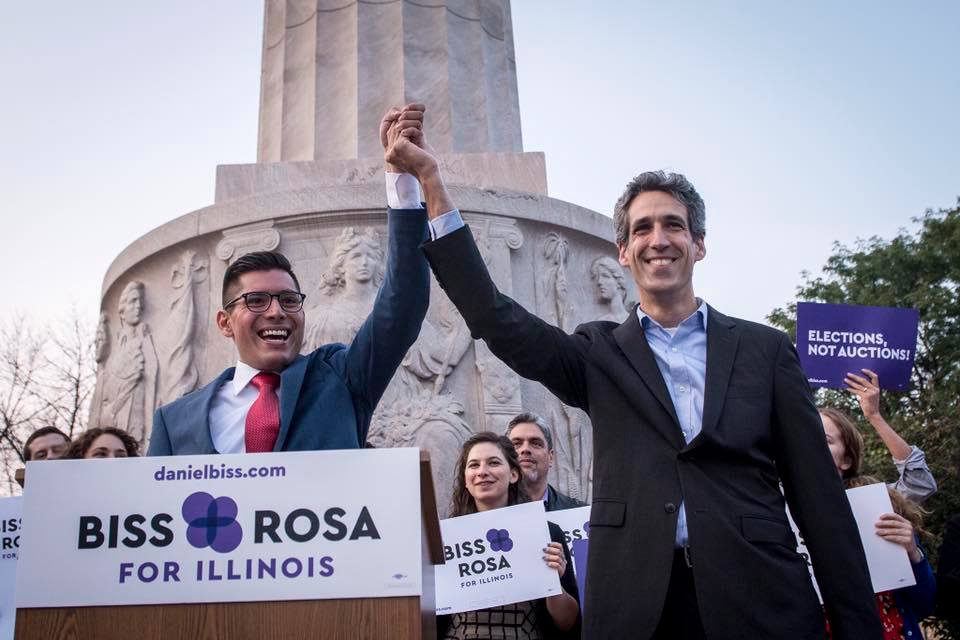On September 3, Felix Biederman, a co-host of the popular leftist podcast Chapo Trap House and a major player in far-left Twitter, tweeted a less-than-inspiring statement about the ongoing Democratic primary race for Illinois governor, featuring State Senator Daniel Biss, millionaire Chris Kennedy, and billionaire J.B. Pritzker.
Daniel Biss is really your best choice for a non-reptile Illinois governor
— Yule Hog (@ByYourLogic) September 4, 2017
The endorsement, such as it was, was likely prompted by Biss’s August 31 selection of Alderman Carlos Ramirez-Rosa as running mate. (Editor's note: The author of this article worked as an unpaid intern on Biss’s unsuccessful 2008 campaign for state representative, and has not worked for Biss since then.) Ramirez-Rosa closely allied himself with Bernie Sanders during the 2016 presidential primary and is an outspoken member of the Democratic Socialists of America, a group which has emerged as the focal point of leftist opposition to Republican and centrist Democratic policy prescriptions alike.
In Ramirez-Rosa, the left felt it finally had an honest-to-God chance at electing a socialist to state office, and exulted accordingly. (Lee Carter’s November election to the Virginia House of Delegates had not yet occurred.) It appeared for a moment as if Biss could unite enough of the Illinois left wing to knock off his two big-name, big-money centrist opponents in the primary.
But when reports emerged that Ramirez-Rosa, like many of his DSA comrades, endorses the Boycott, Divestment, and Sanctions (BDS) movement to end what he calls “the oppression of the Palestinian people” by Israel, that moment quickly faded. Biss, who is Jewish, and whose grandmother is a Holocaust survivor, dropped Ramirez-Rosa from the ticket on September 7. The candidate was left floundering, stripped of crucial support from either the party’s far-left or far-right flanks and still facing two well-funded opponents with money to burn. Biederman weighed in again:
Danny, just put yourself up for adoption so Pritzker can finally just be your dad. you're letting him run everything else in your life
— Yule Hog (@ByYourLogic) September 6, 2017
The episode is rife with lessons for contenders in Democratic primaries in 2018, when the political crosswinds that buffeted Biss’s candidacy in September will blow stronger than ever, and with greater consequence.
A powerful left wing is a relatively new reality for Democrats. In the early 1970s, back-to-back thrashings of left-leaning presidential nominees by Richard Nixon forced the party into a defensive crouch that ultimately resulted in Bill Clinton’s Third Way and the wholesale adoption of neoliberal politics into what had once been the party of Franklin Roosevelt.
Since that time, centrist Democratic candidates haven’t worried much about losing support from the far left in the general election, because there hasn’t been a plausible alternative. Now there is, in the form of DSA. And truly far-left candidates haven’t had to think about building a coalition for general election success because, for the better part of the last two decades, such success has been wholly out of reach.
But with anti-Trump sentiment running high in the Democratic base, and a new crop of energized leftists, Democratic candidates are once again having to reckon with a substantial bloc of voters who aren’t willing to fall in line with the party platform. Leftist candidates, in command of pluralities but still not majorities, are working to find ways to run campaigns that can win 50 percent plus one in November.
Where such candidates are finding success, as in Lee Carter’s Virginia effort, they’re often running campaigns tightly focused on local issues—infrastructure, education, and housing—and steering clear of international hot-buttons like Israel where the national DSA platform still falls well outside of the American, and even Democratic, mainstream. Running a socialist campaign while calling yourself a socialist still hasn’t been a reliably successful electoral strategy; running a socialist campaign based on socialist ideas, framed in a local context, has. It’s a tough balance to strike.
Biss wasn’t able to this September, and he’s now even more unlikely to emerge victorious in the March primary than he was before this misstep. (However, his new running mate State Representative Litesa Wallace, a committed progressive, has gone a long way towards stabilizing his campaign.)
Ramirez-Rosa, for his part, recently entered the race for Luis Gutiérrez’s open congressional seat in the Fourth District, and will now get a chance to see if his brand of uncompromising left-wing politics will play at a new level. It’s a sign of the times that the man running on his right, Cook County Commissioner Jesús "Chuy" García, was hailed as the left-wing alternative to Rahm Emanuel in the 2015 mayoral race.
As Democratic primaries across the country heat up in the spring and early summer of 2018, Illinois’s September episode will serve as a warning to candidates running in the live-wire, high-energy political environment of the Trump era—of the swift retribution for reading the moment wrong, and the tremendous rewards for reading it right.



